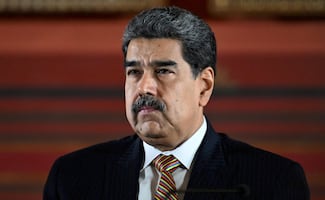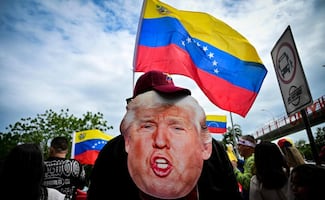Más Información

Nicolás Maduro dio pasaportes diplomáticos a narcos y facilitó aviones para lavar dinero hacia México; de esto lo acusa EU

Captura de Maduro es "un paso importante, pero no suficiente"; Edmundo González llama a una transición democrática real
The prospect of a more united Latin American left grew on Monday after the incoming president of Argentina and his Mexican counterpart discussed reviving a regional diplomatic alternative to the Washington-backed Organization of American States .
Latin American countries have oscillated between left-wing and conservative governments, often with radically different economic and social policies , over the past few decades.
Since last year, anger at corruption, inequality, and poverty have pushed conservatives out in Mexico and Argentina, while fueling protests in recent weeks that forced Ecuador and Chile to water down liberal economic policies.
Have you heard
?
Argentina’s president-elect Alberto Fernández used his first foreign trip since winning office last month to proclaim a new era of leftist cooperation, in an apparent bid to demonstrate he will not be isolated despite South American neighbor Brazil’s right-wing government .
“I am determined to make Latin America united again, to join forces again to face the challenge of globalization in another way,” Fernández told reporters in Mexico’s presidential palace after meeting with President Andrés Manuel López Obrador.
Next year, Mexico will assume the presidency of the Community of Latin American and Caribbean States , a regional body established in Venezuela during late President Hugo Chávez ’s government that has lost influence in recent years.
“That is a chance to boost one of the organisms, one of the spaces for integration that have been forgotten recently,” Fernández said of the organization, seen by some on the left as a future counterweight to the OAS , which they argue is a vehicle for U.S. influence in Latin America.
Mexico’s deputy foreign minister for Latin America lent credence to the idea of the region’s second and third largest economies working together from opposite ends of the continent to revive the grouping known as CELAC .
“Mexico and Argentina have in front of them the opportunity to promote the repositioning of Latin America in the world,” Maximiliano Reyes wrote in the La Jornada daily.
Meanwhile, Argentina’s debt is a problem that the incoming administration must resolve, its president-elect, Alberto Fernández , said on Monday, during a news conference in Mexico.
Speaking on his first overseas trip as the next president of the South American nation, Fernández criticized the debt load his administration will inherit.
“The speed with which debt was taken on and its characteristics were impressive because it is very large and it must be met in the very short term,” he said.
“That is what we have to try to solve.”
Argentina shoulders about USD $100 billion in sovereign debt.
The center-left Fernández also had choice words for the International Monetary Fund , which he said was partly to blame for Argentina’s economic woes.
The multilateral financial organization extended a credit line of USD $57 billion to the recession- and inflation-racked country last year when a run on the Argentine peso currency sparked concerns about a possible sovereign bond default.
“As we have said over and over again, the International Monetary Fun d is also responsible for what is happening in Argentina, and we don’t like the monetary fund,” Fernández said.
The IMF deal, negotiated with outgoing President Mauricio Macri, has been in limbo since the August 11 primary election .
Fernández’s bigger-than-expected margin of victory in the primary pummeled the peso currency and s parked fresh debt fears .
Argentina’s incoming president
will continue his visit to Mexico on Tuesday with a speech at its largest public university.
Alberto Fernández said that he trusts President López Obrador will help Argentina to solve its debt with the IMF.
According to Fernández, the debt went from 28% of Argentina’s GNP to 95% in three years.
“Mexico is green in the IMF directory, because of its relationship with the United States and Canada , and it better understands what happens in Argentina because we are Latin American . I’m sure President López Obrador will do anything he can to help us,” he said.
Fernández also expressed his interest to López Obrado r to replicate the program “Youths Building the Future” in his country and to generate food and vehicle exportation deals.
mp
Noticias según tus intereses
[Publicidad]
[Publicidad]












